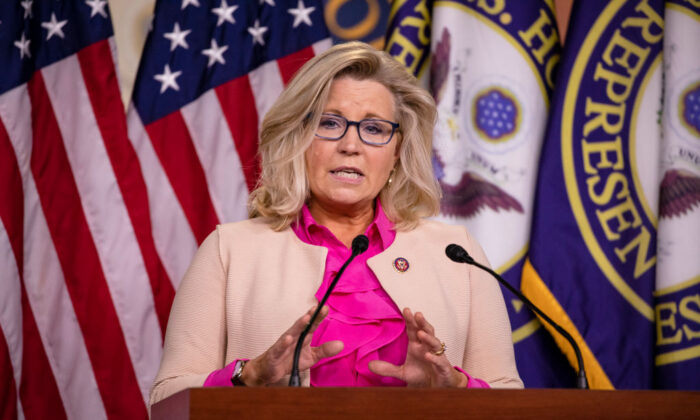Three Republican congress members have introduced a bill that would ban blacklisted Chinese companies and their affiliates from accessing U.S. capital markets.
The legislation, known as the American Financial Markets Integrity and Security Act, would apply to Chinese companies that have been named in either the commerce department’s “entity list” or the defense department’s list of Chinese companies that are owned or controlled by the Chinese military.
The bill was introduced by Reps. Liz Cheney (R-Wyo.), Chris Stewart (R-Utah), and Mike Gallagher (R-Wis.).
“The Chinese Communist Party [CCP] regularly breaches America’s shores to steal our intellectual property, engage in espionage, feed off our markets, and more,” Cheney said in a Nov. 23 press release from her office.
She added: “This legislation is a critical step toward making sure that CCP military companies can no longer exploit U.S. markets in support of China’s pernicious power projection, nuclear build-up, grave human rights abuses, and other malign activities.”
If passed, the bill would also empower the Securities and Exchange Commission (SEC) to ban these Chinese companies from “offering to sell or selling securities” on U.S. security exchanges.
It would also ban investment firms, insurance companies, and retirement funds from investing in these Chinese companies.
Furthermore, federal funds would not be allowed to “enter into, extend, or renew a contract or purchasing agreement” with these Chinese companies, according to the bill.
The Senate companion bill (S.4872) was introduced by Sens. Marco Rubio (R-Fla.) and Mike Braun (R-Ind.) on Oct. 27.
Currently, more than 300 Chinese companies are on the entity list, including Huawei and 152 of its affiliates. American companies are required to apply for a special license before they can do business with these firms.
The Pentagon earlier this year named 31 Chinese companies with links to the Chinese military. The designations were made under a requirement under section 1237(b) of the National Defense Authorization Act (NDAA) of 1999, the annual defense spending bill. These companies included tech giant Huawei, mobile carrier China Telecoms, surveillance equipment maker Hikvision, and railcar-maker CRRC.
According to the language of the bill, the ban would extend to affiliates of these Chinese companies, including parent companies, subsidiaries, and controlling entities.
The bill also introduces an amendment to section 1237(b) of the 1999 NDAA, which would allow either the Secretary of Defense, Secretary of Commerce, or the Director of National Intelligence to add new entities to the list of Chinese companies linked to the Chinese military. The amendment also stipulates that an agreement from all three secretaries is needed to remove a Chinese company from the list.
Finally, the bill also mandates that the director of the U.S. Air Force’s Office of Commercial and Economic Analysis submit a report to Congress focusing on China’s financial ambitions. The report should analyze how Beijing might be benefited from listing Chinese firms in U.S. exchanges, such as how it might advance the regime’s military development strategy known as civil-military fusion.
In 2017, Beijing established a government agency called the Central Commission for the Development of Military-Civil Fusion to oversee cooperation between the military and private industry to advance technology innovations.
“The CCP is implementing this strategy, not just through its own research and development efforts, but also by acquiring and diverting the world’s cutting-edge technologies—including through theft—in order to achieve military dominance,” the U.S. state department describes on its website.
On Nov. 12, President Donald Trump issued an executive order banning American investments into the 31 Chinese companies designated by the Pentagon as being tied to the Chinese military.
Meanwhile, the SEC is moving forward with a regulatory plan to force Chinese companies to comply with U.S. auditing rules or else be delisted from U.S. stock exchanges, according to a recent report by Bloomberg, citing unnamed people familiar with the plan.
The move came following a recommendation from a July report issued by the President’s Working Group on Financial Markets, which includes Treasury Secretary Steven Mnuchin and SEC Chairman Jay Clayton.
Focus News: House Bill Aims to Ban Blacklisted Chinese Companies From US Capital Markets
